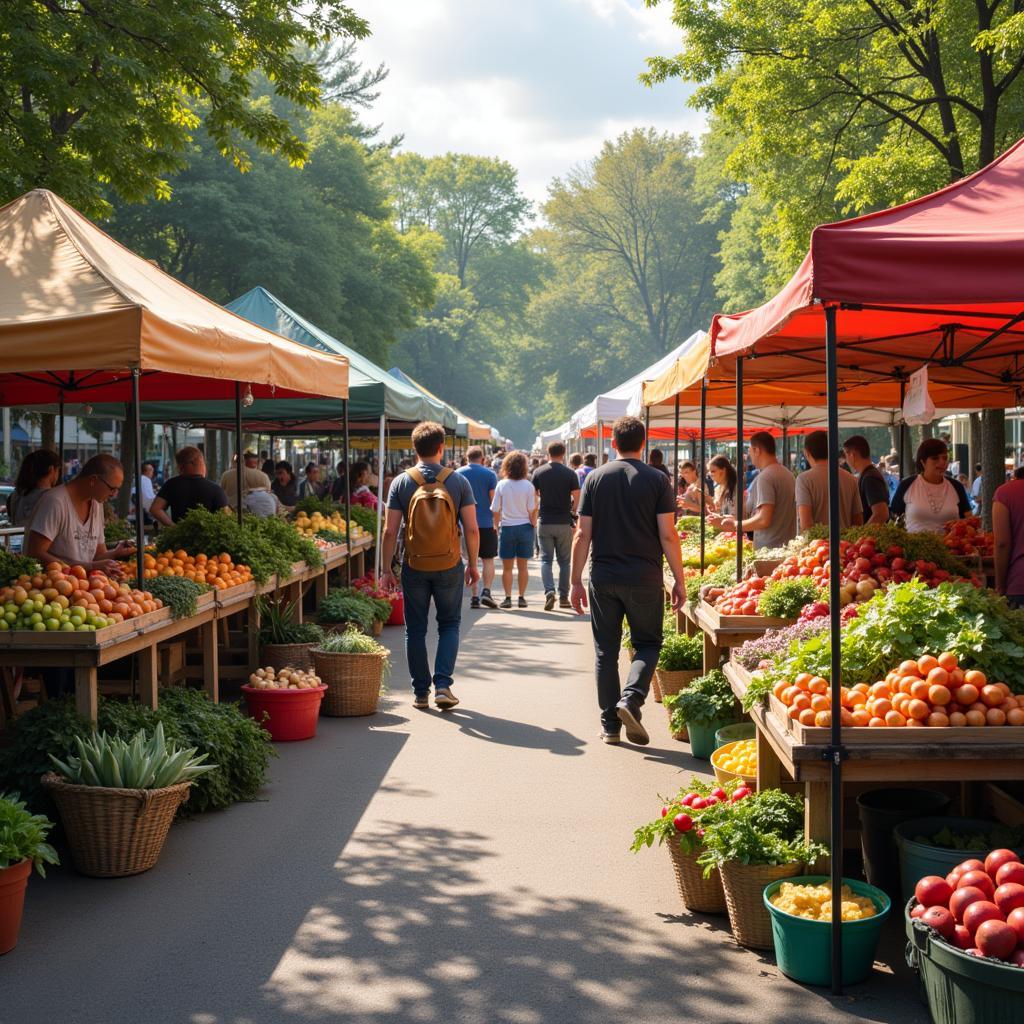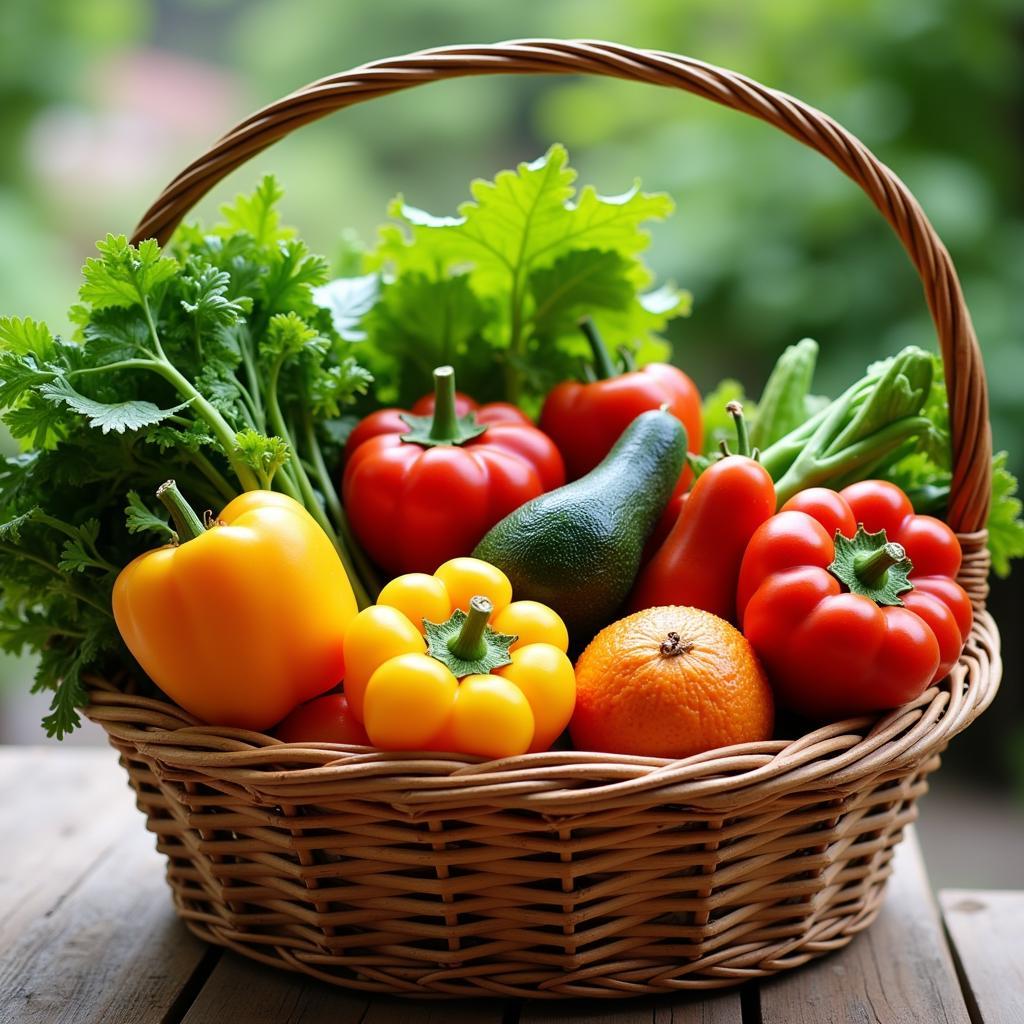The movement towards Local And Organic Food has gained significant momentum in recent years, transforming how we think about food and its impact on our health, communities, and the environment. But what exactly does it mean to embrace local and organic eating? It’s about seeking out food produced sustainably and ethically, prioritizing freshness, flavor, and a deeper connection to the source of our nourishment.
Why Choose Local and Organic?
The benefits of incorporating local and organic food into our diets are multifaceted, extending far beyond simply enjoying a delicious meal. Let’s delve into the compelling reasons why making this conscious food choice can make a world of difference:
1. Supporting Local Farmers and Economies
When you choose local, you’re directly supporting farmers and producers in your community. This strengthens local economies, encourages sustainable farming practices, and fosters a sense of community around food.
 Farmers Market
Farmers Market
2. Fresher, More Nutrient-Rich Food
Local produce is often picked at peak ripeness, packed with flavor and nutrients. Unlike conventionally grown food that travels long distances, losing nutrients along the way, local options deliver optimal freshness and taste right to your plate.
3. Reduced Environmental Impact
By minimizing transportation distances and supporting sustainable farming methods, opting for local and organic food helps reduce greenhouse gas emissions and promotes biodiversity.
 Organic Farm
Organic Farm
4. Avoiding Harmful Pesticides and Herbicides
Organic farming prohibits the use of synthetic pesticides, herbicides, and genetically modified organisms (GMOs). This means choosing organic protects your health and the environment from the harmful effects of these chemicals.
5. Promoting Animal Welfare
Organic livestock farming prioritizes animal welfare, ensuring animals are raised in humane conditions with access to pasture and natural diets. By choosing organic meat, dairy, and eggs, you’re supporting ethical treatment of animals.
Incorporating Local and Organic Food into Your Life
Transitioning to a more local and organic lifestyle doesn’t have to be overwhelming. Here are some practical tips to get you started:
-
Visit Your Local Farmers Market: Explore the vibrant world of farmers’ markets to discover fresh, seasonal produce directly from the source.
-
Join a Community Supported Agriculture (CSA) Program: CSAs connect you directly with local farms, providing a regular supply of fresh produce throughout the growing season.
 CSA Basket
CSA Basket
-
Shop at Local Grocery Stores and Co-ops: Many grocery stores and co-ops prioritize sourcing local and organic products. Look for these options when you shop.
-
Grow Your Own Food: Even a small herb garden or balcony planter allows you to connect with your food and enjoy the fruits (and vegetables) of your labor.
-
Cook More Meals at Home: Preparing meals at home gives you complete control over the ingredients and allows you to prioritize local and organic options.
The Future of Food is Local and Organic
The increasing demand for local and organic food signals a shift towards a more mindful and sustainable approach to eating. As consumers become more aware of the impact of their food choices, they are actively seeking out alternatives that prioritize their health, the environment, and their communities.
Embracing local and organic food is about much more than just following a trend—it’s about investing in a healthier, more sustainable future for ourselves and generations to come.
Frequently Asked Questions about Local and Organic Food
1. Is local food always organic?
Not necessarily. While many local farms practice organic methods, not all of them are certified organic. It’s always best to ask farmers about their growing practices.
2. Is organic food more expensive?
Organic food can sometimes be pricier due to the higher costs associated with sustainable farming practices. However, prices are becoming increasingly competitive as demand grows.
3. Where can I find local and organic food near me?
Farmers’ markets, CSAs, local grocery stores, and online directories are great resources for finding local and organic food options in your area.
4. What are some easy ways to incorporate more local and organic food into my diet?
Start by swapping out a few conventional items for local and organic alternatives each week. Focus on seasonal fruits and vegetables, and explore local farmers’ markets.
5. What is the difference between “organic” and “natural” food labels?
The term “organic” is regulated and requires certification, while “natural” has a broader definition and may not guarantee the absence of pesticides or GMOs.
6. Can I trust organic certifications?
Yes, reputable organic certifications ensure that products meet strict standards for sustainable and ethical production. Look for certifications from trusted organizations.
7. How can I support local and organic farmers?
By choosing local and organic products, participating in CSAs, and advocating for policies that support sustainable agriculture, you can make a difference in supporting local farmers.
Need help finding the perfect kosher snack foods? Or perhaps you’re looking for kosher food near Kalahari Pocono? Mina Cones Food is here to help you navigate the world of delicious and ethical eating. Contact us at 02437655121, email us at [email protected], or visit us at 3PGH+8R9, ĐT70A, thôn Trung, Bắc Từ Liêm, Hà Nội, Việt Nam. Our 24/7 customer support team is always happy to assist you.